
October-December 2018
Editorial

Mentors provide guidance and help to navigate the professional landscape and overcome challenges in order to grow personally and professionally. For instance, BCCP, with the funding from the Bloomberg Family foundation, Inc. through the Johns Hopkins Bloomberg School of Public Health (JHSPH), Baltimore, USA, initiated formation of a Tobacco Control Research Network Program in the year 2013. From then onwards, the mentorship program has provided support and guidance to potential tobacco control researchers in Bangladesh for the purpose of developing a local evidence-based research to uplift effective tobacco control policy development and implementation. On the surface, at least, mentoring can seem like a simple tool to implement, but it takes a lot of dedication and focus to excel in that implementation. It has been six years and it is a matter of pride that our Mentorship program has generated such a massive positive response from local tobacco researchers.
We believe that as always, our partners and well-wishers will be with us and will not hesitate to extend their support towards our initiative to make a difference in people’s lives and careers. Success comes with hard work, and training and mentorship can help people to put hard work in the right place which can bring out the best outcomes.
A Milestone Success of USAID-Ujjiban-CSS Team
SBCC becomes a steering wheel for the HPN program implementation requires strategic implementation and monitoring.
-Mr. Md. Habibur Rahman, Additional Secretary (PH&WH), MoHFW
The National Committee for Health, Population and Nutrition (HPN) SBCC Strategy Implementation and Monitoring took its own course to hold its first meeting on October 21, 2018 in the MoHFW conference room. This meeting was Chaired by Mr. Md. Habibur Rahman, Additional Secretary (PH&WH), MoHFW while it was co-chaired by Mr. A K M Mohiul Islam, Additional Secretary, Health Education and Family Welfare Division, MoHFW.
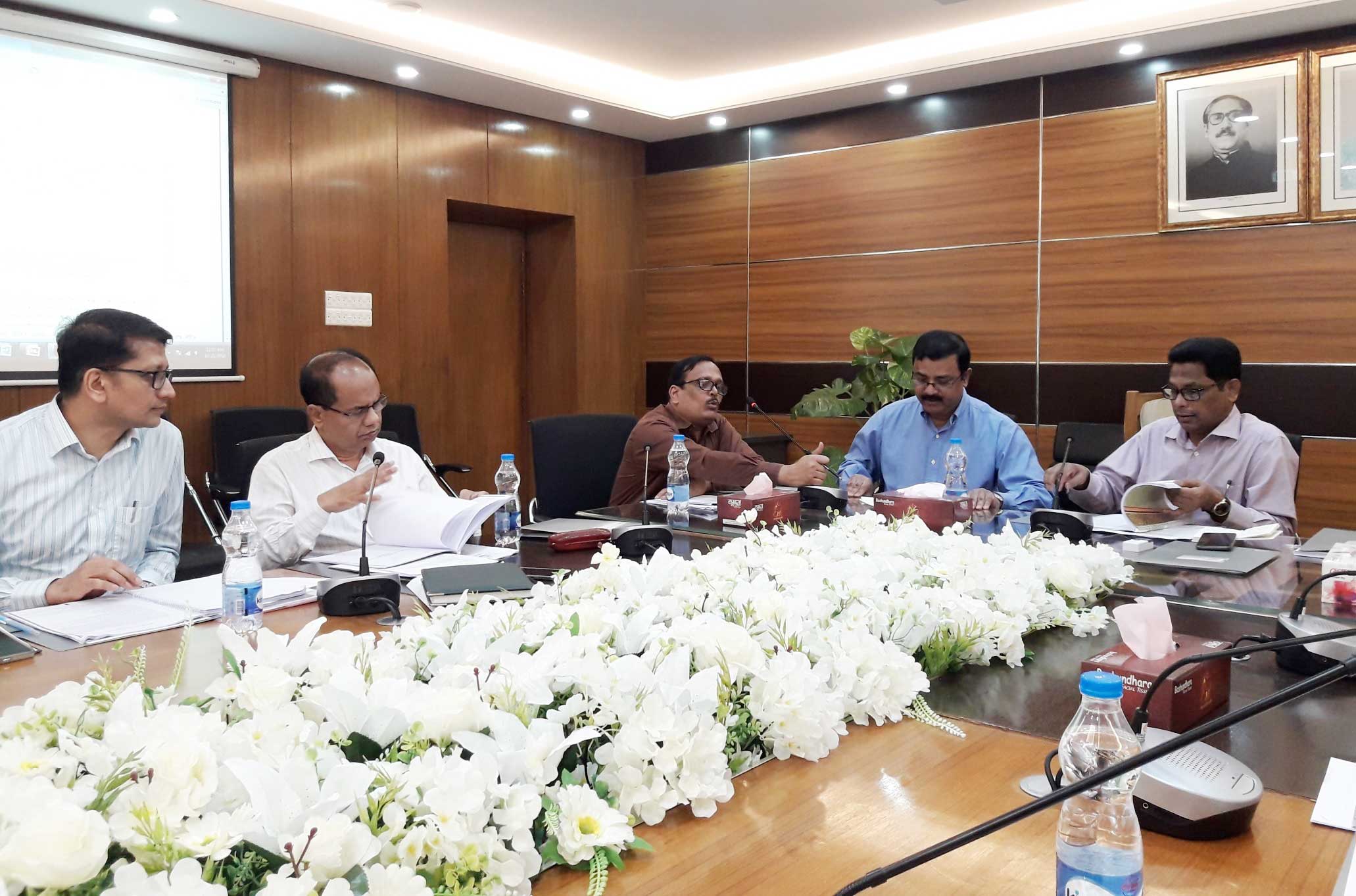
Key decision of the meeting includes;
- NCD and CDC units of the DGHS, Health Economic Unit of the MoHFW and Ministry of Local Government, Rural Development and Co-operatives will be co-opted as member of the National Committee
- All HPN GoB OPs, Implementing Partners and NGOs will send the yearly SBCC activity reports for the period of July 2017-June 2018 to the Member-Secretary of the committee
- All possible efforts to undertake in order to avoiding the work duplication and attain maximum impact
- Ujjiban will provide technical assistance to organize two divisional level orientation workshops on the detail work plan following SBCC strategy
- A report on the SBCC Best Practice will be asked from the HPN GoB OPs, Implementing Partners and NGOs to share in a national level fair for possible replication in other projects
- NTP will include SBCC activities with necessary budget in course of the next OP revision.
At the end the Co-chairperson of the committee urged upon the members to follow the decisions of today’s meeting and thanked meeting attendees for their active participation. The Chairperson extended thanks to USAID for their support and to Ujjiban SBCC project for their continuous effort providing technical assistance to the MoHFW. It is mentionable that the CSS team of USAID-Ujjiban-BCCP is working for the SBCC capacity and system strengthening of the offices/directorates under the MoHFW.
Emphasizing on coordinating activities at the meeting of the HPN SBCC Coordination Committee
GoB HPN programs can attain synergistic impact over the inter-unit coordination -Abdul Aziz, Chief, BHE

IPHN, IEM and BHE made presentations over their work progress and issues related to the coordination between the units. As the HPN Coordination Committees has now been formalized with the government orders and extended to District and Upazila level, the meeting emphasized on further integration of the coordination issues between the units and with the ministry. In conjunction of this point of discussion the meeting had a good level of interactions and came up with following decisions for better coordination amongst and between the units.
-
Decisions of the HPN Coordination Committee meeting minutes will specifically mention the point person to pursue or implement the decision. This minute will have uploaded in the BCCWG website along with the websites of the respective units.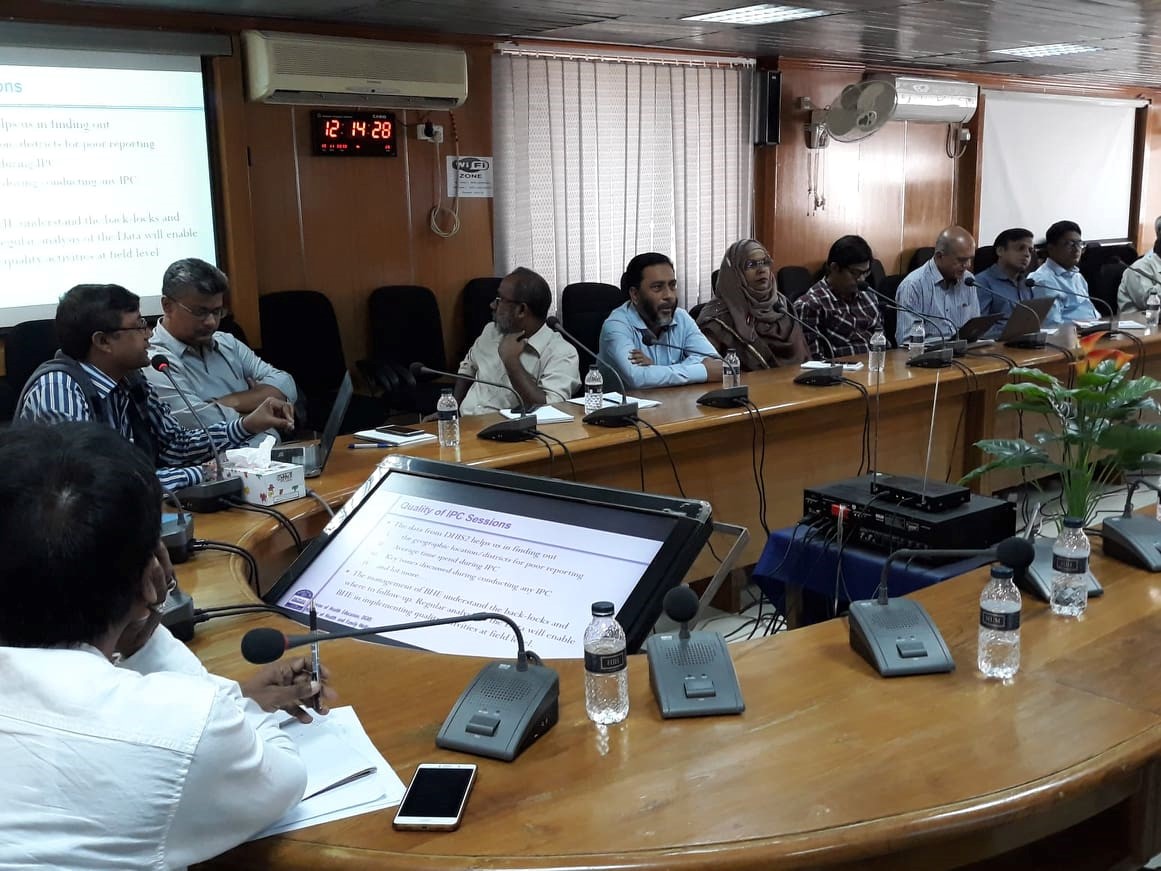
- Formation and activation of the HPN Coordination Committee at the district and upazila level following the government order has been emphasized.
- Minutes of the HPN Coordination Committee meeting will be sent to the Additional Secretary-PH&WH and Additional Secretary-HE&FW.
- Minutes of the HPN Coordination Committee meeting will be sent to the respective HPN units along with the notice of the next meeting.
- IPHN, BHE and IEM will select two representatives from each of the units to participate in the workshop on developing mobile aps on the monitoring and supervision.
- The next meeting of the HPN Coordination Committee will be held on a suitable date in January 2019.
At the end Mr. Abdul Aziz emphasized on the importance of coordination between the HPN units to attain a synergistic impact of the program with the same level of effort, time and cost. He thanked the participant for their participation and input in the meeting. It is mentionable that the CSS team of USAID-Ujjiban-BCCP is working for the SBCC capacity and system strengthening of the offices/directorates under the MoHFW.
Meeting of BCC Working Group: to Combine and Integrate the SBCC Activities of NGOs and Government
A unified and coordinated SBCC approach of DGHS and DGFP together with NGO will bring a better impact in the HPN fields
- Md. Habibur Rahman Khan Additional Secretary (PH&WH), MoHFW
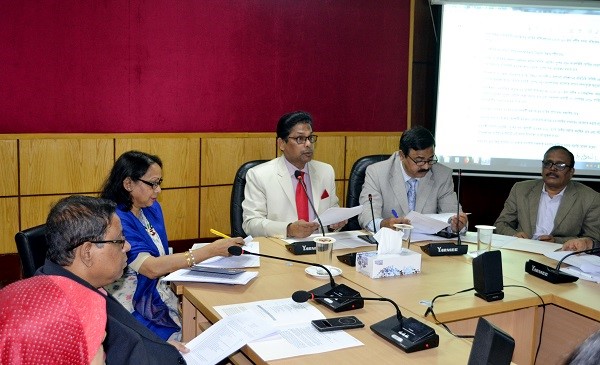
Behavior Change Communication Working Group (BCCWG) in its 26th meeting further emphasized on the need of coordinated effort for HPN SBCC activities in order to maximize utilization of resources, avoid work duplication and bringing a synergistic impact for the program. This meeting was held on December 27, 2019 in the IEM conference room of the DGFP Chaired by Mr. Md. Habibur Rahman Khan Additional Secretary (PH&WH), MoHFW while Mr. Kazi A.K.M Mohiul Islam, Additional Secretary (FP, FW & law), MoHFW attended the meeting as Co-chair. Other officials include; Mr. Md. Ruhul Amin Talukder, Joint Secretary (PH-2), Ms. Asrafunnesa, Joint Secretary and Director (IEM), Dr. Samir Kanti Sarkar, Director (IPHN) and Dr. Md Sarwar Bari, Line Director (FP-FSD).
There was a good level of discussion took place while reviewing the minutes of the last meeting that led in coming up with decision on the following issues;
- A uniform School Health Curriculum has to be followed by entire units of the DGHS and DGFP those are having School Health Programs. The HPN School Health Curriculum as have been developed by the IEM could have been followed by other units with necessary adaptations.
- As there was updates over the annual HPN SBCC report, the meeting decided to develop a printed version of the report and expected to get the first draft by January 15, 2019.
- Following the GO over the formation of the HPN Coordination Committees at the District and Upazila level it became responsibility of the HPN units and the NGOs to get these committees activated and functional through their field forces.
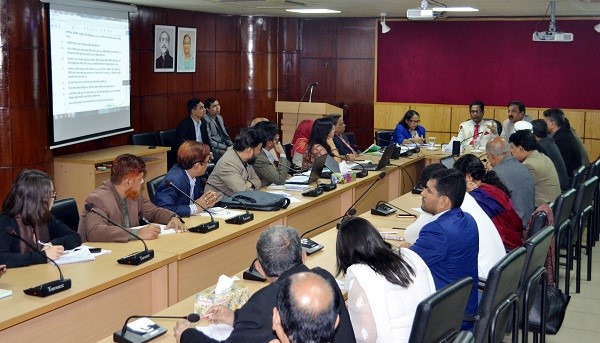
The meeting was participated by HPN unit representatives from the IPHN, BHE of DGHS and CCSDP, FSD, MCH and MIS of DGFP. NGO representatives include; Ipass, SMC, Inca, WASH, mpower social enterprise, Sisimpur project, FPAB, Challenge TB, JICA and Ujjiban. In order to share SBCC activities for last three months, organizations brought it up through presentations. These activity sharing presentations were made by the IPHN, JICA, BHE, mpower, Challenge TB, Ujjiban and IEM.
The presentations highlighted few innovative approaches that brought up attention and interactions in the meeting. The Unit Directors had some specific comments over these presentations as below;
Director-IEM: While coming up with SBCC activities in the BCCWG meeting the Units and NGOs requires to consider comprehensive SBCC strategy and line it up with four key activity domains.
Director-FSD: In addition to mass media and social media channel we also need to consider IPC as one of the most effective channels for communication.
In their remarks the Co-chair emphasized on the synchronization of efforts in implementation of SBCC activities to attain better impact. The Chairperson of the meeting underscored the need of a unified and coordinated SBCC approach of DGHS and DGFP together with NGO which will bring a better impact in the HPN fields. It is mentionable that the CSS team of USAID-Ujjiban-BCCP is working for the SBCC capacity and system strengthening of the offices/directorates under the MoHFW.
Workshop for institutionalization of Government Tender Forum (GTF)
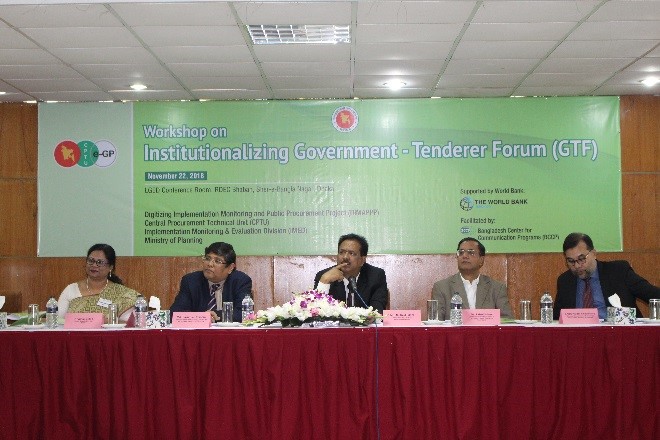
BCCP organized a workshop on November 22, 2018 in the LGED conference room, Agargaon Dhaka with an aim to institutionalize the Government Tenderers’ Forum (GTF). Mr. Md. Mafizul Islam, Secretary, IMED, Planning Ministry attended the workshop as the chief guest. Mr. Md. Faruq Hossain, Director General, CPTU, IMED, Planning Ministry were present as special guest. Dr. Zafrul Islam lead Procurement Specialist, World Bank, Mr. Shish Haider Chowdhury, Director (Coordination and Training), CPTU, IMED and Mr. Ali Nur, Additional Chief Engineer, LGED, Dhaka were present as guests of honor in the workshop.
Total of 80 professionals including high level officials, tenderers’ and media personalities were present in the workshop.
Speakers in the workshop mentioned that 50% of the total tenders are now operated on e-GP system, which resulted in deposits of 13-20% to the government fund. To ensure best utilization of money in government procurement process on e-GP system, good relationship between tenderers’ and procuring entity has to be created. To maintain this good relationship and to create this well-established, sustainable and powerful government procurement system GTF has to be institutionalized.